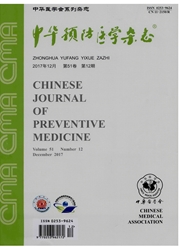

 中文摘要:
中文摘要:
精准医学是今后国际医疗行业的发展方向,精准营养作为精准医学的重要分支,日益受到营养学界的广泛关注。精准营养旨在考察个体遗传背景、生活特征(膳食、运动、生活习惯等)、代谢指征、肠道微生物特征和生理状态(营养素水平、疾病状态等)因素基础上,进行安全、高效的个体化营养干预,以达到维持机体健康、有效预防和控制疾病发生发展的目的。精准营养干预的实施离不开对个体营养需求的精准化衡量,发现监测营养水平的灵敏标记物和检测手段,发展精准的治疗方案和干预措施等过程和阶段。目前临床研究发现多种类型单基因遗传病和复杂的多因素导致的急性或慢性代谢性疾病患者大多可通过精准化的营养干预达到有效地控制病情进展,改善治疗效果的目的。同时普通人群则由于生活习惯、膳食因素、生理状态、环境暴露和遗传特征等的差别,对营养存在个体化的需求,同样需要精准的营养干预,达到保障健康、有效预防疾病的目标。因此,精准营养势必成为精准医学时代下的营养科学和疾病预防科学的重要发展方向。
 英文摘要:
英文摘要:
Precision medicine has been increasingly incorporated into clinical practice and is enabling a new era for disease prevention and treatment. As an important constituent of precision medicine, precision nutrition has also been drawing more attention during physical examinations. The main aim of precision nutrition is to provide safe and efficient intervention methods for disease treatment and management, through fully considering the genetics, lifestyle (dietary, exercise and lifestyle choices), metabolic status, gut microbiota and physiological status (nutrient level and disease status) of individuals. Three major components should be considered in precision nutrition, including individual criteria for sufficient nutritional status, biomarker monitoring or techniques for nutrient detection and the applicable therapeutic or intervention methods. It was suggested that, in clinical practice, many inherited and chronic metabolic diseases might be prevented or managed through precision nutritional intervention. For generally healthy populations, because lifestyles, dietary factors, genetic factors and environmental exposures vary among individuals, precision nutrition is warranted to improve their physical activity and reduce disease risks. In summary, research and practice is leading toward precision nutrition becoming an integral constituent of clinical nutrition and disease prevention in the era of precision medicine.
 同期刊论文项目
同期刊论文项目
 同项目期刊论文
同项目期刊论文
 Identification of a New Class of MDM2 Inhibitor That Inhibits Growth of Orthotopic Pancreatic Tumors
Identification of a New Class of MDM2 Inhibitor That Inhibits Growth of Orthotopic Pancreatic Tumors Association of variants on ADIPOQ and AdipoR1 and the prognosis of gastric cancer patients after gas
Association of variants on ADIPOQ and AdipoR1 and the prognosis of gastric cancer patients after gas The Impacts of Circulating 25-Hydroxyvitamin D Levels on Cancer Patient Outcomes: A Systematic Revie
The Impacts of Circulating 25-Hydroxyvitamin D Levels on Cancer Patient Outcomes: A Systematic Revie Associations between variants on ADIPOQ and ADIPOR1 with colorectal cancer risk: a chinese case-cont
Associations between variants on ADIPOQ and ADIPOR1 with colorectal cancer risk: a chinese case-cont Effects of Benzo[]pyrene Exposure on Human Hepatocellular Carcinoma Cell Angiogenesis, Metastasis, a
Effects of Benzo[]pyrene Exposure on Human Hepatocellular Carcinoma Cell Angiogenesis, Metastasis, a Targeting of tumour-infiltrating macrophages via CCL2/CCR2 signalling as a therapeutic strategy agai
Targeting of tumour-infiltrating macrophages via CCL2/CCR2 signalling as a therapeutic strategy agai 期刊信息
期刊信息
